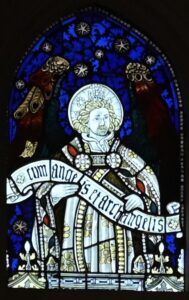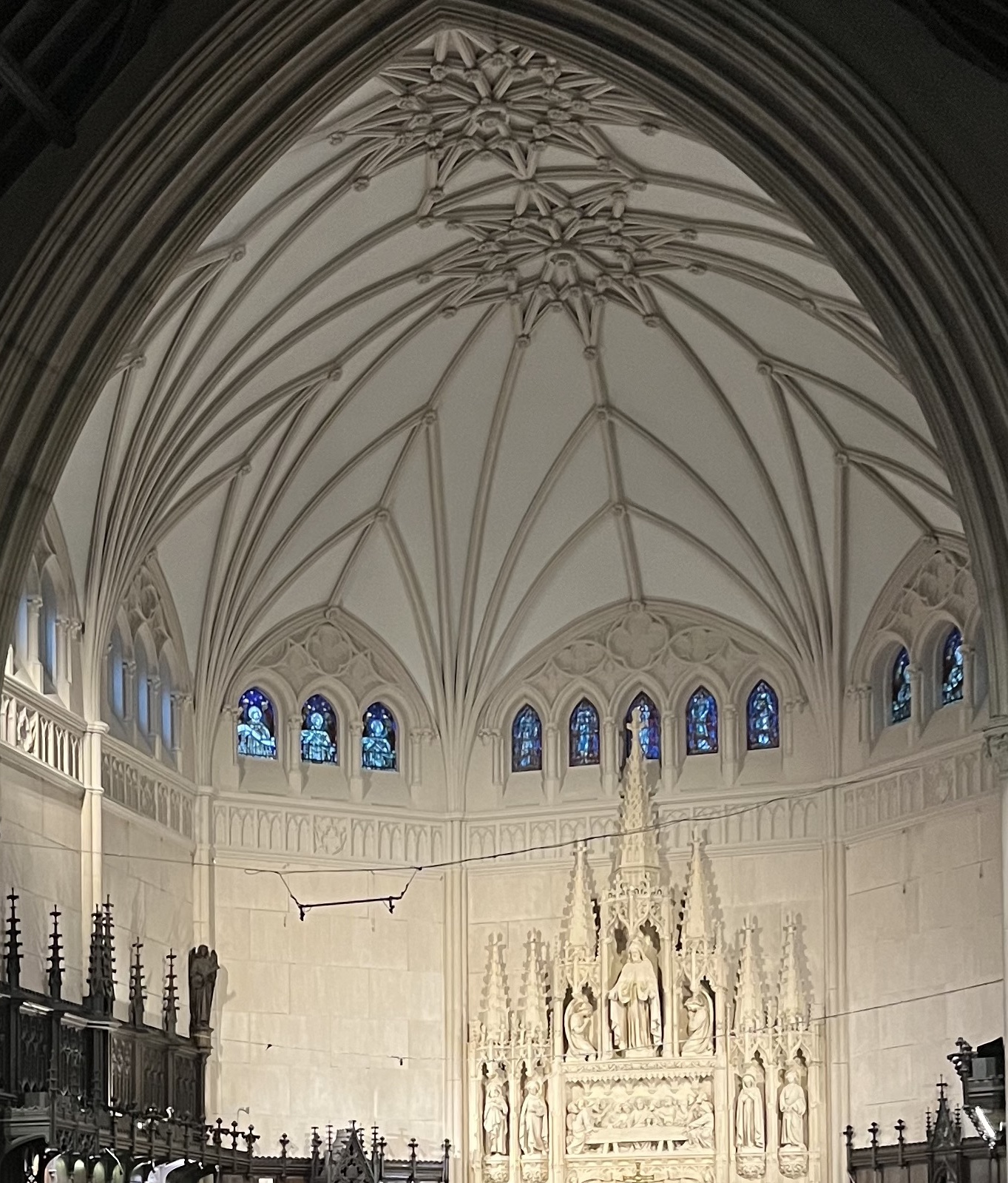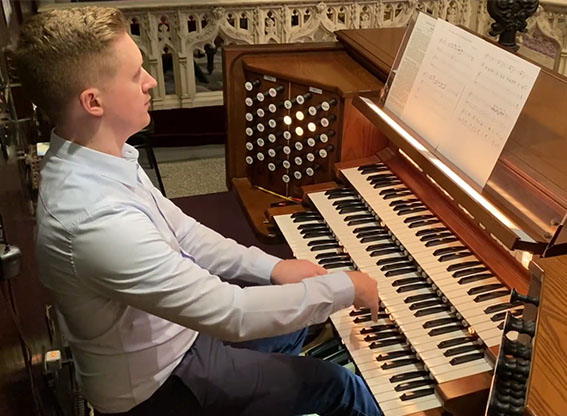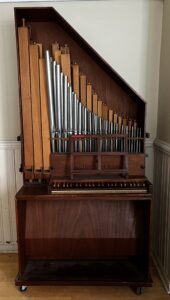- 6 Jan. Our Candidate for Holy Orders, The Rev. Joshua Padraig (Paddy) Cavanaugh, was ordained to the priesthood at All Saints Church, Richmond VA.
- 4 Feb. Senior Warden Elizabeth (Liz) Levin retired after an eventful four-year tenure. She ably steered us through the Covid pandemic, our rector’s sabbatical, and much more. May her successor Rebekah Shore fill her big shoes!
-
28 April. The Rt. Rev. Dr. Carol J. Gallagher, Assistant Bishop of our diocese, presided at our Sunday service for the dedication of Ted Southwick’s statue of the late Rt. Rev. Barbara Harris.
- May. With funding from Hanna and James Bartlett, John Tiedemann’s crew cleaned our Sanctuary’s reredos and walls below its clerestory. Jim Anderson designed a replacement herald for a window that had been broken in 2000 by firefighters.
Charles Connick had designed its original to match Kempe’s heralds in the south clerestory. Its banner reads in Latin: with angels and archangels. We thank Jill Zunshine, who funded it in memory of her husband Zach and in thanksgiving for her faith and hope.
- 28 Sept. The Rt. Rev. Alan M. Gates preached and presided at a service commemorating the Centennial of Lindsey Chapel.
Tag Archives: ordination
Reasons to Rejoice
The Third Sunday of Advent, 3B, December 14, 2014; The Rev. Pamela L. Werntz
1 Thessalonians 5:16-24. Rejoice always, pray without ceasing.
John 1:6-8, 19-28. This took place in Bethany across the Jordan where John was baptizing.
O God of hope, may we have the wisdom, the strength, and the courage to seek always and everywhere after truth – come when it may and cost what it will.
One of the benefits of sharing sanctuary and programs, families and friendships, with a synagogue is that we are regularly called out of theological complacency when it comes to our Christian scripture and Church tradition’s references to Jews – or Levites, priests from Jerusalem, high priests, Sadducees, scribes, or Pharisees. I changed the word Jews in our Gospel lesson to Judeans by way of putting a speed bump in our path, not because Judeans is necessarily the best translation of Judaios here, but because I want us all to slow down a little bit when we listen to this reading. John the Evangelist (that is, John, the Gospel writer) begins his version of the story of Jesus with tension between “the Jews” and Jesus in a way that the other three Gospel writers do not. For John the Evangelist, the tension started before Jesus even appeared on the scene. It’s not exactly clear to scholars who John means when he writes Judaios. He’s certainly not talking about all Jews or all Judeans even at the time, since Jesus and his followers were all Jewish. He may be contrasting Judeans and Galileans, but most likely he’s writing about some of Jerusalem’s religious authorities.[1] He clearly has an ax to grind that the other Gospel writers do not have. The Gospel of John uses the term Judaios some sixty-four times compared with six in the Gospel of Mark, five in Matthew, and three in Luke.[2] It seems that John, who was writing in the late first century, is caught up in a late-first-century conflict, which he is applying retroactively to the first part of the first century. I wonder if John is using the word the way some of us refer to “the police,” “the military,” or “the government,” when we are angry or despairing in the midst of struggle. I don’t know John’s intent, but I do know that we cannot let it slide. Continue reading
2016
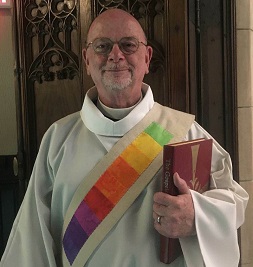
The Rev. Robert Greiner
June. The Rev. Robert Charles Greiner was ordained to the diaconate and began his blessed tenure with us.
Kevin Neel began his six-year tenure as organist and director of our parish choir.
2003
31 May. Our 12th rector, The Very Rev. Pamela L. Werntz, was ordained to the priesthood in our diocese by The Rt. Rev. Thomas M. Shaw, SSJE. Having graduated from the Episcopal Divinity School, she was sponsored for ordination by Christ Church, Cambridge, whose rector The Rev. Robert Tobin was her mentor.
1995
The Rev. Dr. Deborah Little 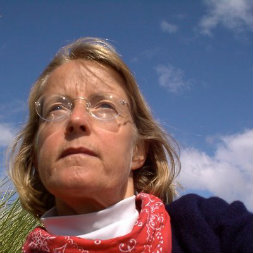 Wyman, who was sponsored by Emmanuel, was ordained to the priesthood by the Rt. Rev. Barbara Harris, the Episcopal Church’s first woman bishop. She describes her “Journey to Street Priesthood” on common cathedral’s website. See also 1996.
Wyman, who was sponsored by Emmanuel, was ordained to the priesthood by the Rt. Rev. Barbara Harris, the Episcopal Church’s first woman bishop. She describes her “Journey to Street Priesthood” on common cathedral’s website. See also 1996.
1977
January 8. Pauli Murray was ordained a priest at the Washington National Cathedral by the Rt. Rev. William F. Creighton, bishop of the (Episcopal) Diocese of Washington. She was the first African American woman, and one of the first women, to be ordained a priest in the Episcopal Church.
February 13. At the invitation of the rector of The Chapel of the Cross, Chapel Hill NC, the Rev. James Peter Lee, The Rev. Dr. Murray celebrated her first Eucharist. She read from her grandmother Cornelia Smith‘s Bible, from a lectern that had been given in memory of the woman who had owned Cornelia, Mary Ruffin Smith. This was the first time a woman celebrated the Eucharist at an Episcopal church in North Carolina. In her autobiography (1987), p. 435) Pauli described her thoughts about the service, which our Parish Historian Mary Chitty attended:
Whatever future ministry I might have as a priest, it was given to me that day to be a symbol of healing. All the strands of my life had come together. Descendant of slave and of slave owner, I had already been called poet, lawyer, teacher, and friend. Now I was empowered to minister the sacrament of One in whom there is no north or south, no black or white, no male or female – only the spirit of love and reconciliation drawing us all toward the goal of human wholeness.
See also:
- The Episcopal Archives’ Leadership Gallery features video coverage of Murray offering the Eucharist in her grandmother’s church, which was later published in 1985 by the television series “On the Road”.
- Pauli Murray
- Timeline entries: 1951, 1970, 1973, 1974, 1985, 1987, 2012 & 2015.
1976
-
27 Jan. Craig Smith & Edward Simone conducted a free concert in celebration of Mozart’s 220th birthday. With standing-room only in our sanctuary, soprano Jane Bryden brought the house down with Popoli di Tasaglia (K.318), which Globe correspondent Richard Buell deemed “flabbergasting [and] insouciant”. They celebrated Mozart’s birthday with a concert for years to come. Lenny Matczynski, who later became its executive director, joined the orchestra of Emmanuel Music.
-
Pauli Murray received a Master of Divinity degree from General Theological Seminary. She was then ordained a deacon in The Episcopal Church by The Rt. Rev. Morris F. Arnold, Suffragan Bishop of Massachusetts.
-
The Episcopal Church, at its General Convention in Minneapolis, voted to ordain women as priests, beginning January 1, 1977.
1973
- Pauli Murray, who was a vestry member, left her tenured position at Brandeis U. and entered the General Theological Seminary. The Rev. Alvin L. Kershaw had helped her discern a call to ordination.
Once I admitted the call of total commitment to service in the church, it seemed that I had been pointed in this direction all my life and that my experiences were merely preparation for this calling. In spite of my own intellectual doubts and the opposition to women’s ordination which was widespread within the Episcopal Church at the time, I took the fateful step of applying to The Rt. Rev. John Melville Burgess, Bishop of the Diocese of Massachusetts, for admission to holy orders. (Autobiography, 1989, p. 427)
-
4 Nov. Priscilla Rawson Young gave a portable pipe organ, built by James Ludden, which is still used for rehearsals in our Music Room.
See also:
1910
- In an ongoing summertime effort, semi-weekly harbor excursions to Bass Point, Nahant, were arranged for about 800 parishioners and their friends.
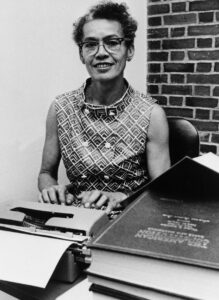 20 Nov. Anna Pauline Murray was born in Baltimore MD. Pauli (as she became known) was to become a famous civil-rights lawyer, a member of our vestry, our postulant for Holy Orders, and a saint of The Episcopal Church. For details of her many accomplishments, please see our guide to resources about her.
20 Nov. Anna Pauline Murray was born in Baltimore MD. Pauli (as she became known) was to become a famous civil-rights lawyer, a member of our vestry, our postulant for Holy Orders, and a saint of The Episcopal Church. For details of her many accomplishments, please see our guide to resources about her.



